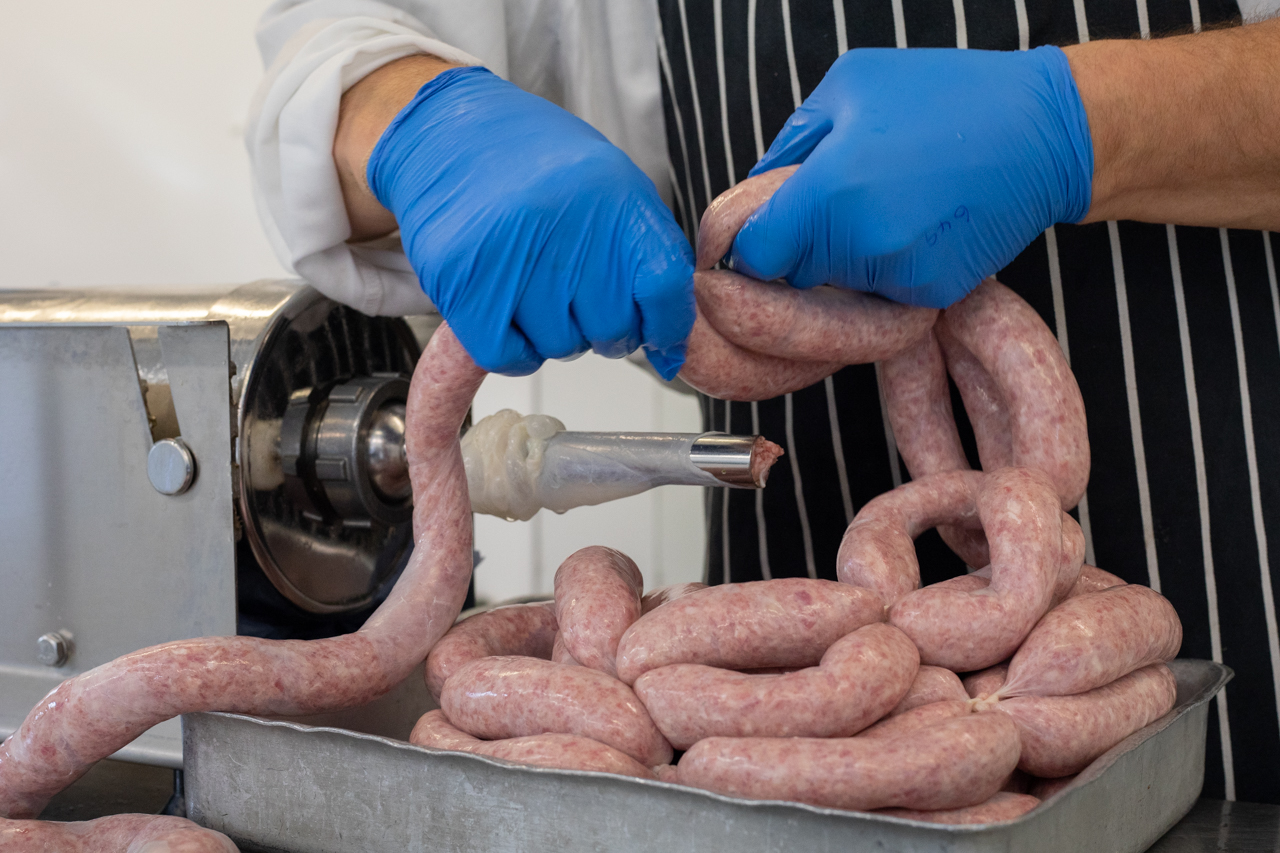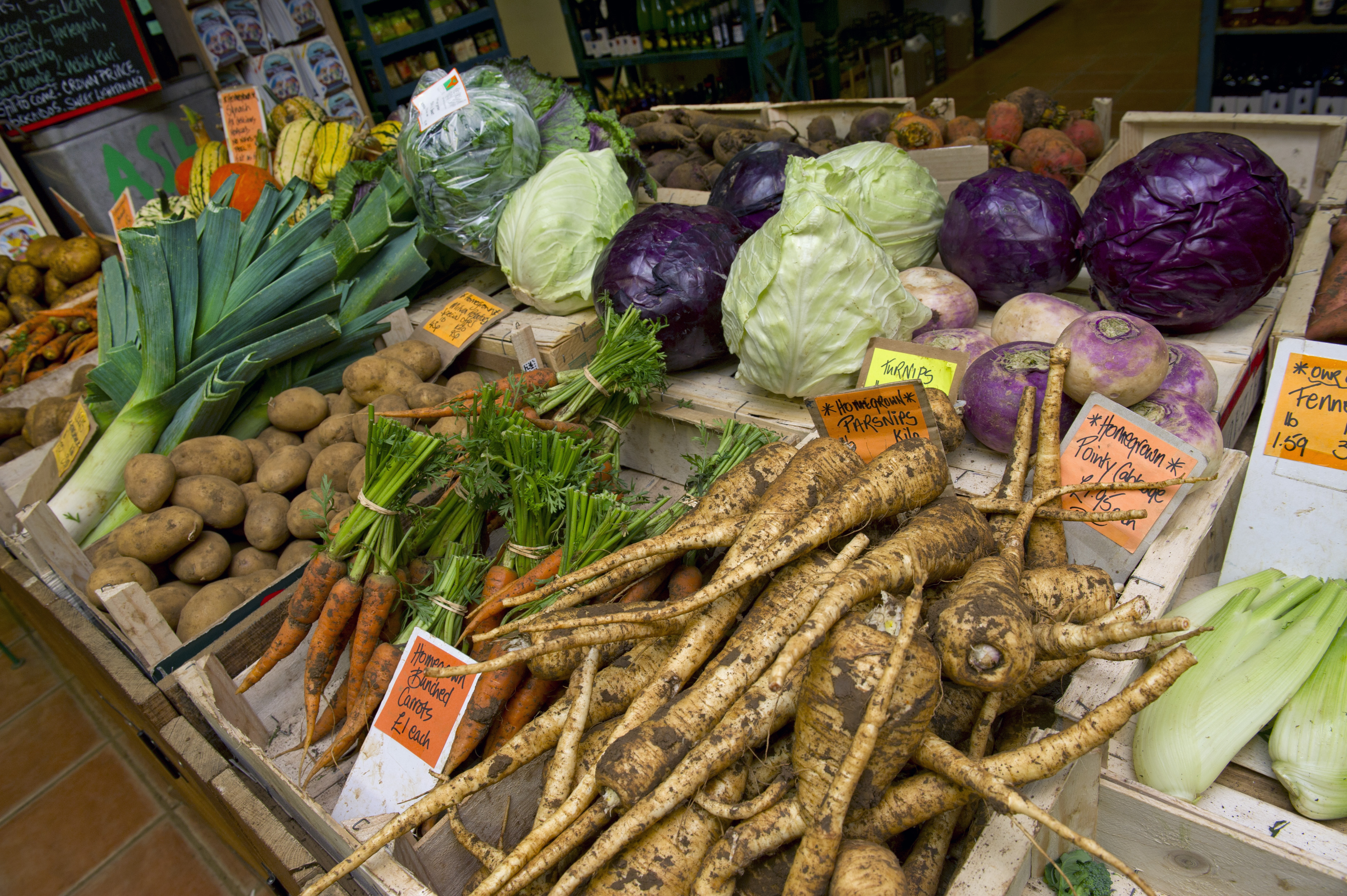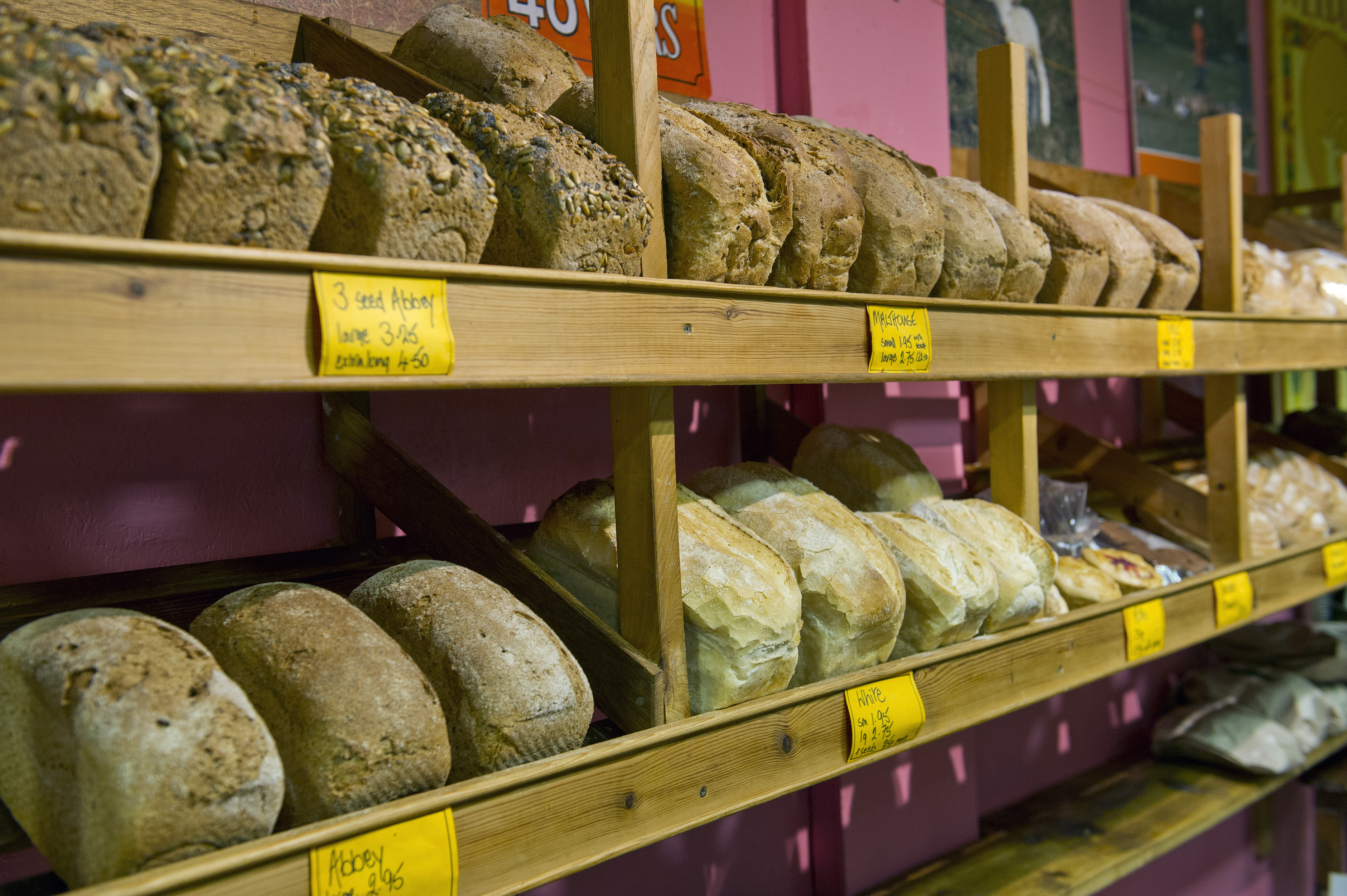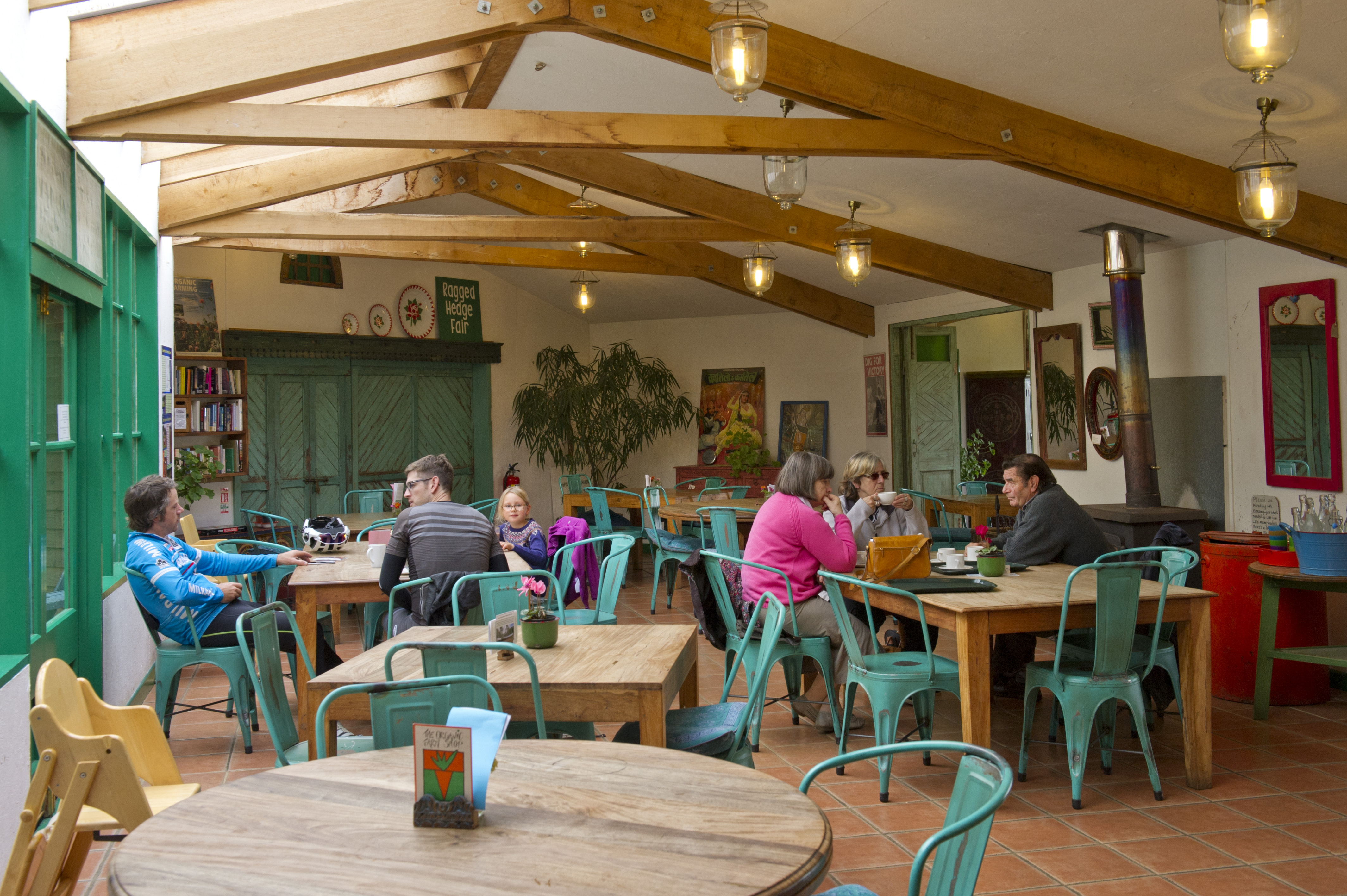Free digital copy
Get Speciality Food magazine delivered to your inbox FREE
Get your free copy
Walking around her family’s farm on a cool, crisp morning, Hilary Chester-Master says she feels an enormous sense of pride at what they’ve collectively achieved – particularly when the bank manager wasn’t originally convinced by her vision of creating a wholly organic business.
There is a tangible air of purpose at The Organic Farm Shop at Abbey Home Farm near Cirencester, which permeates the entire site. From the shop itself, which bursts with an almost impossibly huge array of homegrown produce, to the popular café, the gardens (where the next generation of organic growers are being shown the ropes), and even the onsite children’s nursery, which encourages outdoor play and adventure in nature.
Of course, like many who’ve wound up running a farm shop or diversifying, none of what Hilary sees around herself on a daily basis was planned. She and husband Will were quite happily operating a shop in Cirencester selling Indian goods 35 years ago. Beautifully printed fabrics. Tactile reclaimed furniture with stories to tell. Intricate pieces of jewellery. “That was our life,” she says, remembering packing up their three children for their annual cross-continent buying expeditions.
Meanwhile, Will’s family had been farming all around the Cirencester area since Tudor times. “After the war, like most farmers, they turned to chemicals,” Hilary explains. “When Will grew up and we got together, because we had both, since the 70s, embraced organic and environmental issues, we felt uncomfortable being a part of the family farm. Although we did love it, we found it difficult.”
In 1990, the couple – concerned about the impact of modern conventional farming – decided to up sticks and go back to Will’s growing roots, considering taking on a smallholding near Totnes, where they could grow their raise their own produce, and continue to operate their shop.
But, “Will’s family decided, actually, we could try and work organically on the family farm, which, at that time, was a very brave thing to do. In 1990 I don’t think there were any large organic farms in this country.” Hilary and Will became custodians of the mixed farmland. She admits it felt like they were ‘in over their heads’ at the beginning.
“Although we’re both country people and really into conservation, neither of us actually wanted to be a farmer,” she laughs. “We had to find a farm manager. And to our delight, he’s still here today! He took over the day-to-day running of the farm, and by 1997 all our products were organic – the meat, the milk, the crops.”
Which was all great.
“However, I found people would come up to me and says it’s a lovely farm, but that they were still shopping in the supermarket. We weren’t really providing local food for people. What I really, really wanted to do was to have people come onto the farm, to see how food was growing and raised, and to make this almost a one-stop shop.”
Taking stock, and taking root
Hilary was a woman on a mission. And that mission began with the founding of a vegetable garden, which, she admits, “failed miserably” in its first year. She doesn’t punish herself too much, though, “I had three kids and a busy shop to cope with! We did have a part-time grower. I said to him ‘would you work for us full time here and we’ll start a farm shop?’ and he said, ‘I’d be mad if I said yes’. He was here for 17 years and set up the vegetable garden. Then the farm manager learned about laying hens and table birds and dairy. We brought in pigs, and took on a part-time butcher. So slowly, slowly we grew to where we are now. What I’d call a proper farm shop.”
The Chester-Masters’ commitment not only to remaining staunchly organic, but also to squeezing every last drop of potential out of their land in a nature-friendly, sustainable way, is astounding.

Meat in the butchery – pork, lamb, beef, chicken – for example, is all grown on the farm (apart from turkeys from a trusted supplier) to ensure its standard never wavers from what they, and their customers, expect. “Because we’re certified organic there’s a big difference between us and other producers. That we cannot buy GM feed for our animals makes this incredibly expensive. It’s very stressful buying in feed, but we supplement it with what we grow here.”
In addition to rearing livestock to supply the butcher’s counter, the farm has a herd of, primarily, dairy Shorthorns and Red Friesians that are milked twice a day. Most of the milk goes into an organic co-operative, which Will and Hilary were founder members of. The rest is siphoned into their on-farm vending machine for customers to top up their own bottles. Or…is transformed into something entirely different by The Organic Farm Shop’s cheesemaker Sarah.
“She makes an excellent halloumi-style cheese, and another cheese called Patience, because you do have to be quite patient to make cheese, and it was Will’s grandmother’s name. That’s a semi-hard cheese. We also have a Cheddar. They are good, honest, local cheeses,” says Hilary. “We’re not looking to win awards. It’s just very nice to eat, and to know it was made here, on the farm.”
Dairy endeavours at The Organic Farm Shop don’t end there. “We produce cream, and make the most amazing thick, creamy yoghurt. When the blackcurrants are doing their thing, we usually have a gorgeous blackcurrant yoghurt, sold in returnable glass jars,” Hilary says.

A growing ambition
Perhaps one of the most exciting and incredible aspects of the farm shop, especially taking into account the changeable and oftentimes devastating growing conditions of the past few years, is its vegetable garden. An unbelievable 180 varieties of vegetables and fruit are grown in these 15 acres, with Hilary seeing the space as a ‘training ground’ for others. “We always have apprentices here. We have our own scheme and have been doing that for 16 years now. We’ve got ex-apprentices all over the country doing wonderful things. When they’re with us it’s all on-the-job training and they get paid a proper wage. It’s fantastic. It means we have a very enthusiastic workforce who are keen to learn.”
As we type, with prime harvest season behind us, and cooler days on the way, The Organic Farm Shop still manages to have more than 40 types of homegrown produce on its shelves. In future years, the bounty at the height of the growing period will be even more extensive, thanks to the recent planting of over 100 apple, plum and pear trees as part of the site’s agroforestry plans.
“A lot of farm shops, quite understandably, focus on meat, but because I’m vegetarian, we focus on vegetables,” says Hilary.
There’s nothing too ‘out there’ on the growing roster, she continues. “We grow our favourite tomatoes, Sungold, which taste like little sweets. And Black Russian – big, juicy ones. There are five varieties of carrots, three or four different cabbages, two sorts of potatoes, celeriac, shallots, white onions, red onions, three types of beetroot. And so it goes on.”
Though, she admits, they do like to experiment. An apprentice has grown ginger in the garden, and their second-hand Dutch glasshouse, installed three years ago, has opened up a delicious new world, gifting them grapes and watermelon.
It’s not the biggest money spinner, growing veg. “But I want customers to have everything on their plate from the farm,” Hilary explains.
Any grower or farmer worth their salt knows ‘adding value’ is one of the best ways to extract the best profit from their crops. Vegetables and fruits from the farm find their way into the onsite café-restaurant, where they are transformed into wonderful, largely vegetarian, dishes. Excess soft fruits are frozen and sold in the shop for customers to turn into smoothies and crumbles, or turned into jams and preserves in the kitchen, ready to spread between layers of cake, or to be displayed in the shop alongside the farm’s own honey.

Surely, The Organic Farm Shop is one of the most productive in the country, we tell Hilary, who has also just informed us they bake their own bread – some from their own heritage wheat, processed down the road at Shipton Mill.
She shrugs this off modestly.
Turning passion into profit
How difficult, even with such an abundance of homegrown and homemade fare, was it to begin stocking a solely organic business in the 90s? “It was actually easy when we started,” Hilary remembers. “Suma had huge lists to choose from. We could have had five peanut butters if we wanted to. We started with a very small shop, and after three years still had the Indian shop, which subsidised it. We either had to get bigger, or stop. I really really wanted it to work, but it wasn’t easy. The shop wasn’t busy, and the turnover wasn’t big enough. We would have one pasta and pasta sauce, and tins of beans, some wine, and a few bits and pieces.”
Expanding (to a few thousand products) and adding trollies, made a huge difference to sales. “Literally the day we opened the extension to the shop we doubled our turnover. It was uncanny. It helps so much having a trolley, because people can shop like they might in a supermarket. We’re not upselling in any way other than that. All I want is to make the shop look as loving and welcoming as possible and let people buy if they want to buy. If they just want a cup of coffee, they can do that too.”
Hilary favours a “pressure-free” sales environment. “A lot of people come to work here, asking about targets, and how much we’re selling per square foot. I know the experts would say ‘oh God you silly hippies’. For me, I’m still crossing my fingers. We’ll be 25 in June. I feel good energy attracts good energy. If you create a nice friendly space, hopefully people will come.”

One of the only tricky times Hilary recalls (apart from during Covid) is the recession of 2008. “The media loved organic until then. With the recession it became the devil. People were being told it was a waste of money.” It took four years for trade to improve, with the family diversifying once more by hosting weddings, which kept business ticking along.
Though the shop suffered during the recession, this was also the time that the family doubled the size of their eatery, which proved a success, as customers sought out “little treats”.
“During the week the café is vegetarian, and every dish is inspired by what’s available in the garden. So, every week with the head cook I do the menu. We have a chat with the growers, they tell us what’s surplus or second grade, and we start with that. At the moment it’s spinach, beetroot and carrots. There will always be one or two soups, a vegan and gluten free dish of the day, and always one vegetarian dish. They come with choices of around seven amazing salads at this time of year. Then Sunday lunch is about 96% from the farm and garden. If you’re a meat eater, the only thing on your plate that’s not grown here is probably the cooking oil!”
Unlike many farm shops, which might add a café to boost the profits of lacklustre sales in store, Hilary says this isn’t the case here. While the café, since it has grown, is well-used, it is the farm shop that remains the heart, soul and breadwinner of the site.
Hilary is a great believer that we have our time on earth to do good. And so it is that the farm has also diversified in other ways across the years…ways that benefit local people and the community.
The Farm Project has operated from the site for the past six years. “For about 30 weeks of the year we have up to 10 young people or children, mainly from vulnerable families, come to spend time here with teachers. We have accommodation for them, and they live here. It’s a nature-nurture programme that really helps them with confidence, self-esteem and life skills. There are two education officers, one of them is my daughter. It gives us so much.”
Additionally, and more commercially, there are two holiday cottages, huts in the woods, a yurt, campsites, and a day nursery that encourages little ones to be outside (including growing their own vegetables).
“Doing this does feel like a dream,” Hilary contemplates. “Especially when I was told ‘organic’ wouldn’t be profitable, or wouldn’t work. I said at the time, ‘if it’s not organic, for me, it won’t happen’, and here we are. You have to do what you stand for. Just do it!”